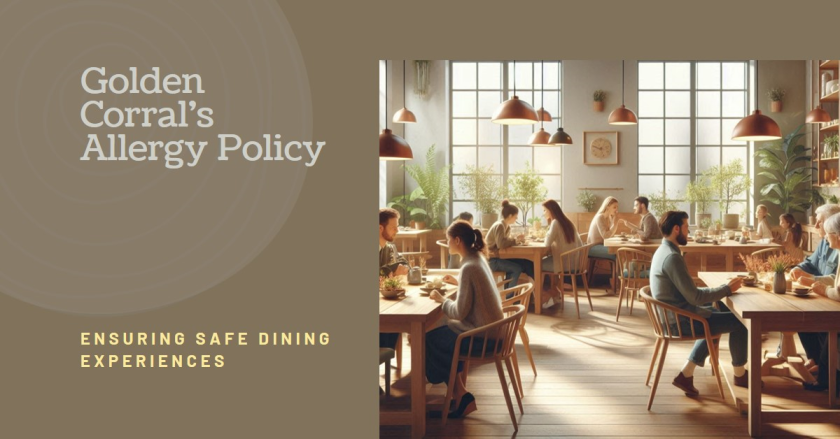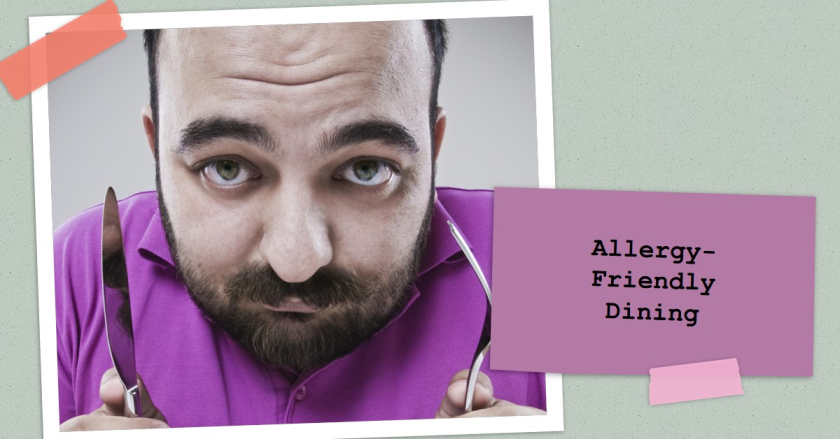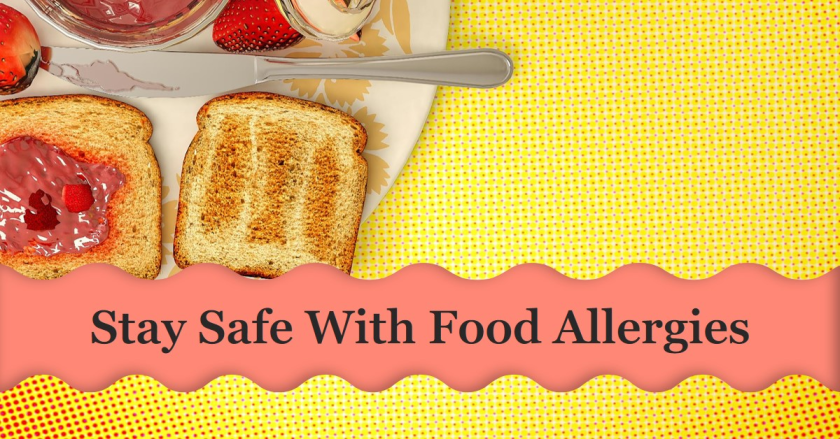Golden Corral helps people with food allergies by being clear about the ingredients they use, teaching their staff, and letting people ask for custom meals. There are many dishes to choose from at a buffet, but there is a chance of cross-contamination because the serving trays and tools are shared.
Golden Corral is one of the most well-known buffet-style restaurants in the US. It is known for having a lot of different kinds of food to suit everyone’s tastes. Golden Corral has something for everyone, from basic foods like fried chicken and mashed potatoes to salads and grilled meats that are better for you.

But it can be scary for people with Food Allergies to eat out, especially at tables. We’ll talk about how Golden Corral treats people with food allergies and what you can do to stay safe while you eat.
Contents
Understanding Food Allergies in a Buffet Setting
A lot of people have major health problems because of food allergies. For people with peanut allergies, gluten intolerance, or dairy intolerance, the chance of allergic reactions can make it hard to eat out. Even a small amount of the allergen can cause anaphylaxis, a response that can be very dangerous and even kill the person. Since people can choose their own food at a table like Golden Corral, there is a higher chance of cross-contamination.
Cross-contamination happens when tools, serving trays, or even airborne bits from one dish touch something else. In restaurants, where people may use the same spoon for more than one dish, or where small pieces of food may fall into trays next to them by accident, this can happen. For people with allergies, this small amount of pollution can be a problem.
Golden Corral’s Approach to Food Allergies

Golden Corral knows how hard it is for people with food allergies. The restaurant company has made an effort to help people with food allergies, even though the buffet table style naturally raises the risk of cross-contamination. It takes care of food issues in a number of ways at Golden Corral.
1. Ingredient Transparency
People who have food allergies are asked to talk to a manager or cook at Golden Corral before they choose what to eat. There aren’t any allergen labels on every dish at the buffet tables, so this is the case.
Most of the time, though, managers and cooking staff can see full lists of what’s in each menu item. Such as peanuts, tree nuts, dairy, eggs, wheat, soy, fish, and shellfish, they can tell you which foods contain these allergens. People can better understand which foods are safe for them to eat and which ones they should avoid by talking to the staff.
2. Custom Orders Upon Request
Food allergies can often get a meal that is made just for them at Golden Corral, even though the restaurant is mostly a spread. You can ask the chef to make you a new plate of food in the kitchen, away from the buffet, for example if you have a serious gluten allergy or need to avoid a certain ingredient. By not using the same tools and food lines, there is less chance of cross-contamination.
It’s not always clear that this is a choice, but if you have a serious allergy and are worried about safety, you should ask the manager about custom orders.
3. Staff Training on Allergen Awareness
The people who work at Golden Corral are taught how to handle food safely and keep it from getting contaminated. This includes being aware of allergens and knowing how to clean plates and cooking tools properly.
The staff is taught how to deal with customers who have questions about allergies and how to separate the areas where food is prepared when needed.
Even though no restaurant can totally get rid of the risk of cross-contamination, the fact that Golden Corral is teaching its employees shows that it cares about the safety of its customers. People who have severe allergies should still be proactive and ask questions to make sure their needs are known and met.
Risks of Cross-Contamination in Buffets
Even though ingredients are listed and workers are trained, cross-contamination is still a big problem when eating at a buffet. There are several ways that cross-contamination can happen in a normal buffet:
- Shared Utensils: When multiple guests use the same serving utensils, there is a chance that allergens from one dish can be transferred to another. For example, a spoon used to serve a dish containing nuts could be accidentally used to serve a nut-free dish.
- Food Spillage: As guests serve themselves, small amounts of food can spill or be transferred between trays. This is especially common in dessert stations, where crumbs from one dessert can easily end up in another.
- Airborne Allergens: In some cases, cooking methods such as frying or grilling can release airborne particles that may contain allergens, such as wheat flour or nut oils. These particles can settle on other foods, increasing the risk for people with severe allergies.
Golden Corral tells people with serious food allergies to talk to a manager about their needs because of these risks. But even though the restaurant can take steps to lower the risk, customers should still be careful about what they eat.
Golden Corral prices offer affordable buffet options, but guests with food allergies should be cautious due to cross-contamination risks. Custom meals can be requested for safety.
Steps You Can Take to Protect Yourself
If you or someone in your party has food allergies and you plan to dine at Golden Corral, there are several steps you can take to minimize the risk of an allergic reaction:

1. Speak to a Manager or Chef
Ask to talk to a boss or chef before you start taking food from the buffet. Tell them about your food allergies and ask what the meals you’re thinking about contain. Managers are usually happy to help, and they might even offer to make you a different meal that doesn’t contain allergens.
2. Stick to Low-Risk Foods
Different types of food are not as likely to get affected with each other. Fresh fruits, veggies, and pre-packaged foods are often safer than baked or fried foods, which are more likely to get contaminated with other foods. There may also be less risk with foods that are made away from the buffet line, like grilled meats from the cutting station.
3. Request a Custom Meal
Do not be afraid to ask for a special meal if you are very worried about cross-contamination. At some Golden Corral restaurants, this might not be possible, but many cooks are happy to make a special meal for people with allergies. Often, this is the safest choice because the meal can be made in a controlled setting with your dietary needs in mind.
4. Bring an Epinephrine Auto-Injector
This is very important if you or someone you’re dining with has had serious allergic reactions in the past. Always have an epinephrine auto-injector, like an EpiPen, with you. No matter how careful you are, mistakes can still happen. Having an auto-injector on hand could save a life in an emergency.
5. Avoid Peak Dining Times
People are more likely to come to the buffet in large numbers on weekends and holidays, which raises the risk of cross-contamination. When the buffet isn’t as busy, the staff may be able to help with special orders more easily.
Conclusion
People with food allergies may find it hard to eat at a buffet like Golden Corral because of the risk of cross-contamination. But Golden Corral has taken a number of steps to help guests with special food needs. For example, they provide information on ingredients, make custom meals, and train their staff on how to be aware of allergens.
Even though these steps are good, people with food allergies should still be cautious and take steps to protect themselves. People who are allergic to Golden Corral’s many foods can lower their risk of having an allergic reaction by talking to the manager, picking low-risk foods, and being ready for emergencies.
Communication is the most important thing when it comes to eating out safely with food issues. The staff at Golden Corral is trained to help, but it’s up to you to make sure they understand what you need and choose safe foods. If you take the right steps, you can enjoy your meal without having to think too much.